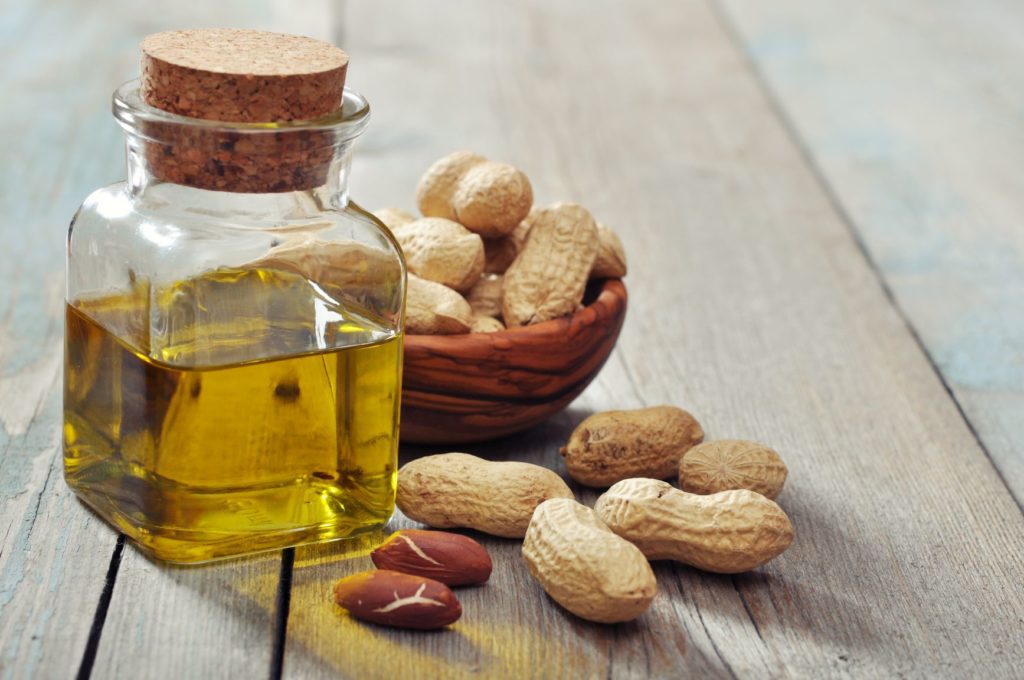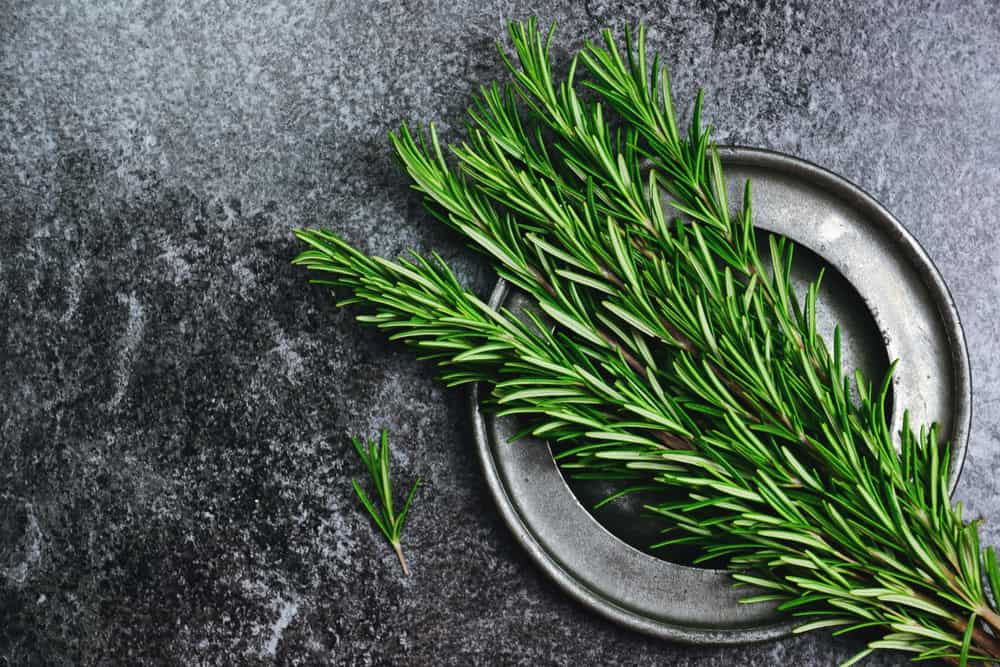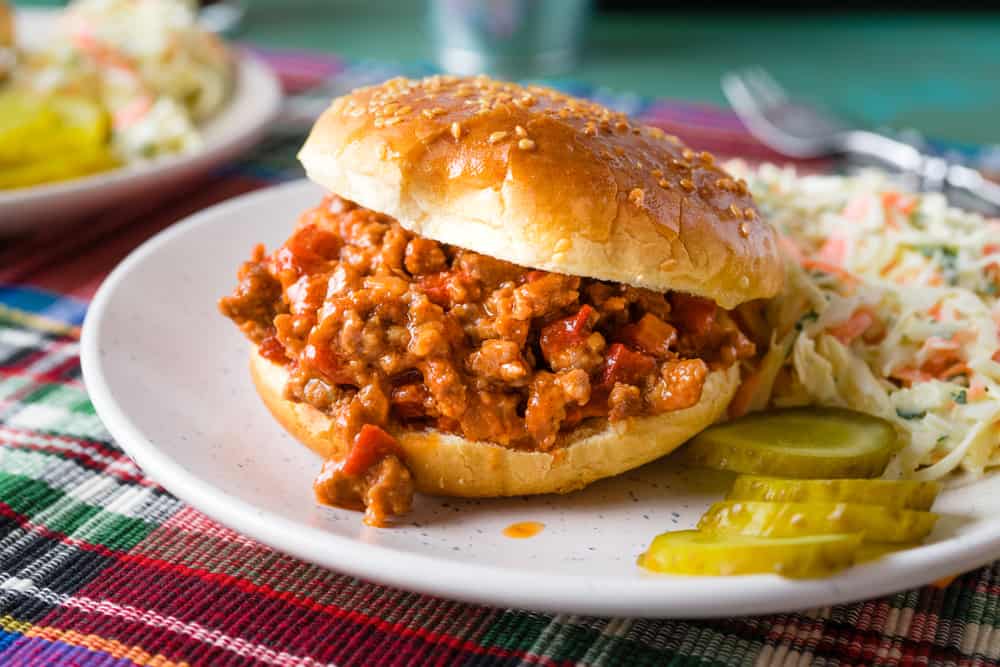Technically speaking, peanuts are a member of the plant family Leguminosae. This is a part of the legume family, which includes beans and peas.
They grow underground and in the form of edible seeds encased in a pod. These fall into the vegetable category, therefore technically, peanut oil is a kind of vegetable oil.
You can substitute peanut oil for vegetable oil in most instances as it has a fairly neutral flavor. It also has a high smoke point, and can be used at high temperatures.
This post may contain affiliate links. Read my disclosure policy here.
What Types of Peanut Oil are there?
Peanut oil is also known as groundnut oil. It is an oil extracted from the seeds of the peanut plant, and there are 4 main types. These are refined, cold pressed, gourmet, and a blend.
Refined peanut oil is commonly found in restaurants. This is oil that has been deodorized and bleached.
Cold-pressed oil is made by crushing peanuts in order to extract the oil. It has a sweet flavor and a strong peanut smell.
Gourmet peanut oil is unrefined and has a much stronger flavor than the other types.
Peanut oil blends are a mixture of oils that taste similar. Due to the blended nature, it is the most affordable type of all the peanut oils.
What about allergies?
If someone has a peanut allergy, we do not advise substituting peanut oil for vegetable oil. The FDA has stated that highly refined peanut oil does not need to be labeled as an allergen.
There have been studies performed on people with peanut allergies that showed most are safe to eat peanut oil. This is due to the oil lacking the proteins required that trigger an allergic response. This does not apply to cold-pressed, extruded, or expelled peanut oil.
What is peanut oil good for?
It is very suited to boiling, stir-frying, broiling, and grilling due to its high smoke point of 437 degrees Fahrenheit. The flavor profile makes it an excellent choice for dressings, marinades, and sauces too.
It is also great for deep frying for the same reasons. It can be substituted in baked goods as well. This is not always suitable as it can impart a peanutty taste to the bake. This is ideal in peanut butter cookies though! It can be substituted for vegetable oil in a 1:1 ratio.
There is a lot of Vitamin E in peanut oil. This has antioxidant properties and is very good for your health. It is also high in omega-9 fatty acids, polyunsaturated fats, and monounsaturated fats.
It is believed that peanut oil can help to reduce your risk of developing heart disease and improve your insulin sensitivity. It can also help you to lose weight, and prevents you from developing cancer.
It can also be used as a topical solution for eczema, dry scalp, and other skin conditions.
What are the downsides of peanut oil?
Peanut oil contains high levels of omega-6 fatty acids which can increase your risk of getting diseases and increases inflammation in the body.
What are other good substitutes for vegetable oil?
Olive oil
This is quite a flavorful oil and will not be suitable for baking substitutes. It has lots of healthy fats and antioxidants, making it one of the most health-conscious oils.
It is ideal for use in dressings, marinades, and cooking at low temperatures.
Coconut oil
This is ideal for anything you wish to add a slight coconut flavor to. It has a high smoke point and is very good for frying and roasting.
The health benefits of coconut oil have been widely debated. Some scientists say it is unhealthy, whereas some researchers believe it can act to lower cholesterol levels in the blood.
Canola oil
This tends to form the basis of most generic vegetable oils, and will work as a good substitute in most applications. It has almost no discernible flavor and will not change the taste of any of your creations.
It is highly processed but contains less saturated fat than most other oils. It is high in the healthy mono- and polyunsaturated fats.
Sunflower oil
This is also a common component of vegetable oil blends. It is flavorless and odorless, making it suitable for a wide variety of dishes.
It has a lot of Vitamin E, an antioxidant, but also a high quantity of omega-6 fatty acids which are thought to cause inflammation.
Avocado oil
The real downside to avocado oil as a substitute is that it is very expensive. There are few situations where it would be a viable option due to the increased cost.
It is unrefined, high in Vitamin E, and high in healthy fats. It also has a high smoke point and a neutral flavor.
Applesauce
This is not useful for frying or roasting, but that should be obvious. It can be used as a great substitute for oil in baking. Applesauce works as a great substitute in cakes, muffins, brownies, and cookies.
You should substitute ¾ cup applesauce for every cup of oil. As apples are so naturally sweet, you should slightly reduce the quantity of sugar in the recipe.
Butter
This is very useful for baking purposes. It can be replaced in a 1:1 ratio, but it is usually better to melt it before adding to your bowl.
Grapeseed oil
This is commonly used in place of peanut oil as it has a high smoke point too. There are many health benefits of grapeseed oil, but also many negative ingredients. Commercially produced grapeseed oil is made using an air pollutant and neurotoxin known as hexane.
It is suited to stir-fries, frying, sauteing, grilling, and roasting. It is more expensive than peanut or vegetable oil and also works as a substitute for extra virgin olive oil.
Summary
Peanut oil can be used as a substitute for vegetable oil in most instances.
It is relatively neutral flavored and technically a vegetable oil in its own right.
Take care with allergies though!





